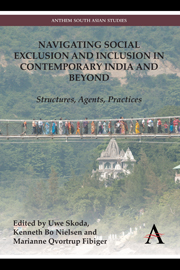 Navigating Social Exclusion and Inclusion in Contemporary India and Beyond
Navigating Social Exclusion and Inclusion in Contemporary India and Beyond Book contents
- Frontmatter
- Contents
- Acknowledgements
- List of Contributors
- 1 Introduction: Navigating Exclusion, Engineering Inclusion
- Part I Spaces and Values
- Part II Communities and Politics
- 5 In Search of Development: Muslims and Electoral Politics in an Indian State
- 6 Exclusion as Common Denominator: Investigating ‘Dalit-hood’
- 7 Inclusion of the Excluded Groups through Panchayati Raj: Electoral Democracy in Uttar Pradesh
- 8 Making Sikkim More Inclusive: An Insider's View of the Role of Committees and Commissions
- 9 Encountering ‘Inclusion’ and Exclusion in Postindustrial Mumbai: A Study of Muslim Ex-millworkers' Occupational Choices
- Part III Resources and Development
6 - Exclusion as Common Denominator: Investigating ‘Dalit-hood’
from Part II - Communities and Politics
Published online by Cambridge University Press: 05 September 2013
- Frontmatter
- Contents
- Acknowledgements
- List of Contributors
- 1 Introduction: Navigating Exclusion, Engineering Inclusion
- Part I Spaces and Values
- Part II Communities and Politics
- 5 In Search of Development: Muslims and Electoral Politics in an Indian State
- 6 Exclusion as Common Denominator: Investigating ‘Dalit-hood’
- 7 Inclusion of the Excluded Groups through Panchayati Raj: Electoral Democracy in Uttar Pradesh
- 8 Making Sikkim More Inclusive: An Insider's View of the Role of Committees and Commissions
- 9 Encountering ‘Inclusion’ and Exclusion in Postindustrial Mumbai: A Study of Muslim Ex-millworkers' Occupational Choices
- Part III Resources and Development
Summary
Through the mechanisms of competitive electoral politics, caste is being continuously reinvented in contemporary India. The ‘deepening’ of democracy has come with a fragmentation of politics, producing new political bodies representing newly politicized groups that express new demands in a new language (Yadav 1999). This development has shattered modernist expectations that democracy, industrialization and economic liberalization would lead to a shift from ‘traditional’ primordial identities to people seeing themselves as citizens whose rights and duties should be negotiated individually, primarily through the ballot. Rather, formulations of rights claims in India have happened increasingly along caste and community lines.
In this chapter, this process of politicization is seen through the idea of ‘Dalit-hood’. The activists who figure here are part of an emerging politics of difference, seeking to redefine collectively the status of the group to which they belong. This politics of difference is based on the assumption that ‘social exclusion’ makes Dalits a unified group. The material I present here is based on six months of fieldwork among Dalit activists in North India in 2009. During this time I spent three months as an intern with the Dalit Cooperation Committee (DCC), a Delhi-based umbrella organization engaging in advocacy, legal aid, mobilizational activities and awareness raising. Divided into four branches focusing on different problem areas, my internship was with the Women's Wing of the DCC. In this urban, middle-class context, the chapter analyses activists' claims to Dalit-hood.
- Type
- Chapter
- Information
- Navigating Social Exclusion and Inclusion in Contemporary India and BeyondStructures, Agents, Practices, pp. 97 - 118Publisher: Anthem PressPrint publication year: 2013


